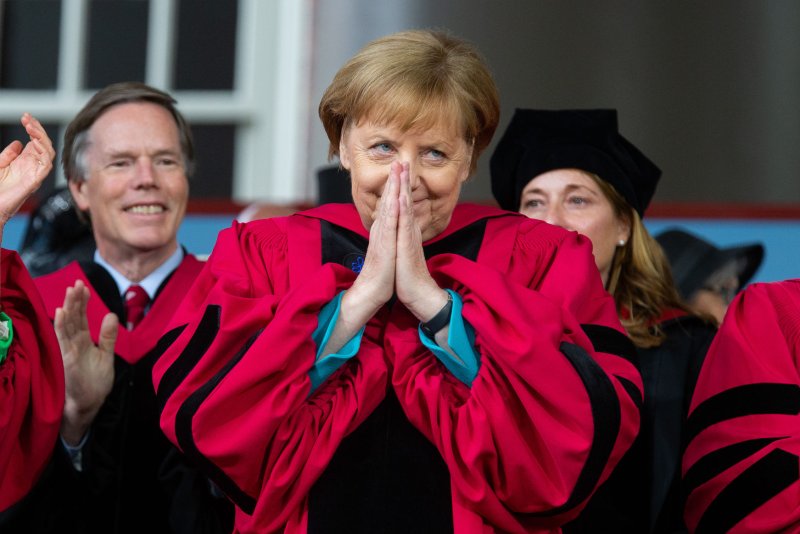1 of 8 | German Chancellor Angela Merkel receives an honorary degree Thursday at Harvard University's 368th commencement on the school's campus in Cambridge, Massachusetts. Photo by Matthew Healey/UPI |
License Photo
May 30 (UPI) -- German Chancellor Angela Merkel delivered the commencement address Thursday at Harvard University hours after she received an honorary doctor of laws degree at the institution.
She told attendees that modern actions taken on the world stage must be "multilateral rather than unilateral" and focus on international concerns rather than nationalistic and isolationist ones.
"In short we have to work together rather than alone," Merkel said.
Merkel reflected on the Berlin Wall and her early upbringing in East Germany. She said she would walk past the wall every day on the way to her apartment and dream of freedom on the other side.
"The Berlin wall limited my opportunities, it quite literally stood in my way. However, there was one thing which this wall couldn't do during all of those years," she said. "It couldn't impose limits on my inner thoughts. My personality, my imaginations, my dreams and desires, prohibitions and coercions couldn't limit any of that."
She also recalled the day the wall fell and used the feeling to deliver words of encouragement to the graduates.
"During these months 30 years ago I experienced firsthand that nothing has to stay the way it is," Merkel said. "Anything that seems to be set in stone, or inalterable can indeed be changed."
Merkel went on to state that she believes that Europe has united for the better and that Germany's relationship with the United States has also improved throughout the years.
"The Transatlantic Partnership, based on values such as democracy and human rights has given us an era of peace and prosperity of benefit to all sides, which has lasted for more than 70 years now," she said.
Merkel also addressed a number of world issues, including condemning protectionism and trade conflicts for jeopardizing free trade, the displacement and forced migration brought on by war and terrorism and the threat of climate change.
She pledged that Germany will reach climate neutrality by the year 2050.
"Climate change poses a threat to our natural resources, it and the resulting crises are caused by humans. Therefore we can and must do everything humanly possible to truly master this challenge to human kind," she said. "It's still possible, however, each and everyone of us must play our part."
Merkel noted how the world has become more connected through technology and encouraged the graduates to wield technology such as virtual reality and automation wisely.
"As federal chancellor, I often have to ask myself, 'Am I doing the right thing? 'Am I doing something because it is right or simply because it is possible?'" she said. "That is something you too need to keep asking yourselves. Are we laying down the rules for technology or is technology dictating how we interact?"
The Ivy League school awarded Merkel the honorary degree during morning ceremonies marking Harvard's 368th commencement.
Merkel is trained as a quantum chemist and lived in Soviet-controlled East Germany for 35 years until the fall of the Berlin Wall in 1989. The reunification of Germany inspired Merkel to leave the scientific field for politics and she ascended the ranks. Her election as chancellor in 2005 marked the first time a woman or a former East German rose to that position.
"She's the one Western leader who's never flinched," said Nicholas Burns, former U.S. Ambassador to NATO and Greece, and director of the Aspen Strategy Group.
"She has a set of strong values, and she understands Germany's history exceedingly well, in part because she comes from East Germany," said Wendy Sherman, under secretary of state for political affairs under President Barack Obama. "She fights for her country and for her people."
Merkel will leave office in 2021 after 16 years as Germany's leader, and become the nation's longest-serving chancellor after Helmut Kohl -- who also spoke at Harvard's commencement, in 1990.
Merkel's address follows a speech from another high-profile leader. Former Vice President and 2000 Democratic presidential nominee Al Gore spoke to Harvard's class of 2019 on Wednesday. In his remarks, the staunch environmental advocate called on the university to divest its fossil fuel holdings.
Gore called climate change a "threat to the survival of human civilization as we know it," and said divesting amounts to a "moral issue" for Harvard.
"Why would Harvard University continue to support with its finances an industry like this that is in the process of threatening the future of humanity?" Gore asked.
The former Tennessee senator also challenged the Class of 2019 to dedicate their lives to reinforcing democratic ideals and reversing the negative impact humans have made on the environment.
Harvard spokesman Jonathan Swain said in a statement administrators are fighting climate change through the school's Climate Action Plan, which outlines a commitment to be fossil-fuel free by 2050.
"While we agree on the urgency of this global challenge, we respectfully disagree with divestment activists on the means by which a university should confront it," Swain said.















